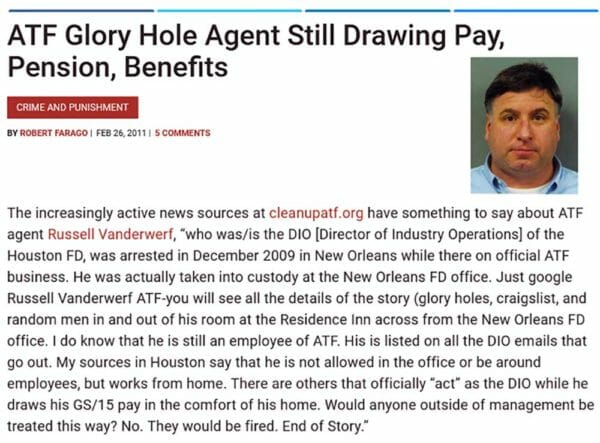Opinion by Rob Olson

Washington, DC – -(AmmoLand.com)- Internal ATF documents obtained by Gun Owners of America show that the agency, once again, is asserting powers not given it by Congress.
This time, the agency appears to be gearing up to force out-of-business federal firearms licensees (“FFL”) to turn over their remaining firearms in inventory to other dealers — even though federal law explicitly allows former dealers to transfer these firearms to their own personal collection.
ATF has even threatened prosecution of former dealers who do not comply with ATF’s unlawful requirement.
For years, ATF operated within the rules Congress established. When an FFL ceases business operations, any firearms remaining in inventory may be transferred either to another dealer or to the licensee’s own personal collection. Either way, the disposition for each and every firearm must be recorded in the dealer’s “acquisition and disposition” (A&D) book. The A&D book, along with other records, must then be transferred either to the ATF out-of-business center, or to a successor licensee who takes over the business.
This is the system set up by federal law. For example, 18 U.S.C. Section 923(c) makes clear that it is perfectly acceptable for a dealer to maintain a “personal collection” of firearms, and even to transfer firearms from business inventory to that collection. And, of course, once a dealer goes out of business, he is no longer a “licensee” under the Gun Control Act, and has no record-keeping duties under the statute. He is entirely a private party, and any firearms that have previously become part of his personal collection are treated no differently than for any other gun owner. Indeed, when it comes to disposing of a personal collection of firearms, 18 U.S.C. Section 921(21)(C) clearly provides that a person may “sell[] all or part of his personal collection of firearms,” without being considered to be engaged in the business, requiring a license.
In other words, federal law explicitly allows a dealer to transfer firearms to his personal collection, which includes any remaining inventory when he goes out of business.
Thereafter, federal law explicitly allows that ex-licensee, now a private party, to sell any and “all” of those firearms without being considered to be “engaged in the business.”
For many years, ATF operated within the statute as written. For example, in its 2012 “FFL Newsletter,” here or back-up here ATF explained that, “[w]hen a licensee elects to discontinue his or her business … licensees have the option of transferring the firearms to their personal collection.”

In 2014, that changed. A December 1, 2014 email from the ATF Deputy Chief, Field Management Staff (the same ATF official who was promoted!?, and reassigned after it was discovered he was running a Craig’s List glory hole for random men in his hotel room) stated that ATF’s “preferred manner for disposing of firearms inventory” was to transfer them to another dealer — not transfer to a private collection, as the statute permits.
Attached to the email was an “Important Notice” signed by Andrew R. Graham, then-Deputy Assistant Director for Industry Operations, which also advised out-of-business FFLs against transferring firearms to their own personal collection. Then came the veiled threat:
“[s]hould a former FFL decide against” transferring his firearms to another dealer, “he/she should be aware that future sales — whether from his/her personal collection or otherwise — will be evaluated for a potential violation of 18 U.S.C. § 922(a)(1)(A).”
The Graham Notice even went so far as to claim that, “[i]f a former FFL is disposing of business inventory, the fact that no purchases are made after the date of license … surrender does not immunize him/her from potential violations.” Contrast that with the statute, which requires, among other things, “the repetitive purchase and resale of firearms” in order to be considered a dealer.
The 2014 ATF threat sounds eerily similar to the January 2016 “executive action” taken by President Obama, claiming that a gun owner could be prosecuted for being “engaged in the business” if he sold even one firearm.
Graham Notice, Selling Firearms AFTER Revocation, Expiration, Or Surrender of an FFL
Based on the same absurd theory, in 2015 ATF prosecuted former FFL Bob Arwady in federal district court in Houston, Texas.
ATF claimed that Bob was “engaged in the business” simply for selling firearms he had transferred to his personal collection when he gave up his license. Gun Owners of America and my law firm, William J. Olson, P.C., helped defend Arwady, arguing that he could not be prosecuted simply for having followed the procedure established by law. Only a few days before trial, ATF finally dropped the “engaged in the business” charges, and, at trial, a jury acquitted Bob of the two remaining counts.
The Arwady case dealt a serious black eye to ATF and the Obama administration, especially in their attempts to go after law-abiding gun owners who sell firearms from their personal collections.
Fast forward to the present. On September 25, 2020, ATF Deputy Assistant Director, Office of Field Operations Megan Bennett issued an instruction to all ATF field offices, ordering that ATF personnel are to “stop publicly disseminating the notice of permissible methods of inventory liquidation to FFLs who go out of business.” DAD Bennett advised that a “revised template” would soon be made available.
It seems that ATF wishes to pick up today where it left off in 2014. ATF does not want out-of-business dealers transferring firearms to themselves, even though federal law expressly permits them to do so. Gun owners can expect that any future ATF guidance on the issue will eliminate the personal collection option, and instead order that all out-of-business dealers must transfer their inventory to other licensees.
ATF’s continued threats to prosecute former dealers who simply follow the law not only is egregious and unlawful but also it represents another situation where the agency seems determined to undermine President Trump as the nation nears an election, by reverting to Obama-era policies to threaten and intimidate law-abiding gun owners.
Rob Olson is a Virginia attorney whose practice focuses on firearms law and the right to keep and bear arms. He represents Gun Owners of America and Gun Owners Foundation.

